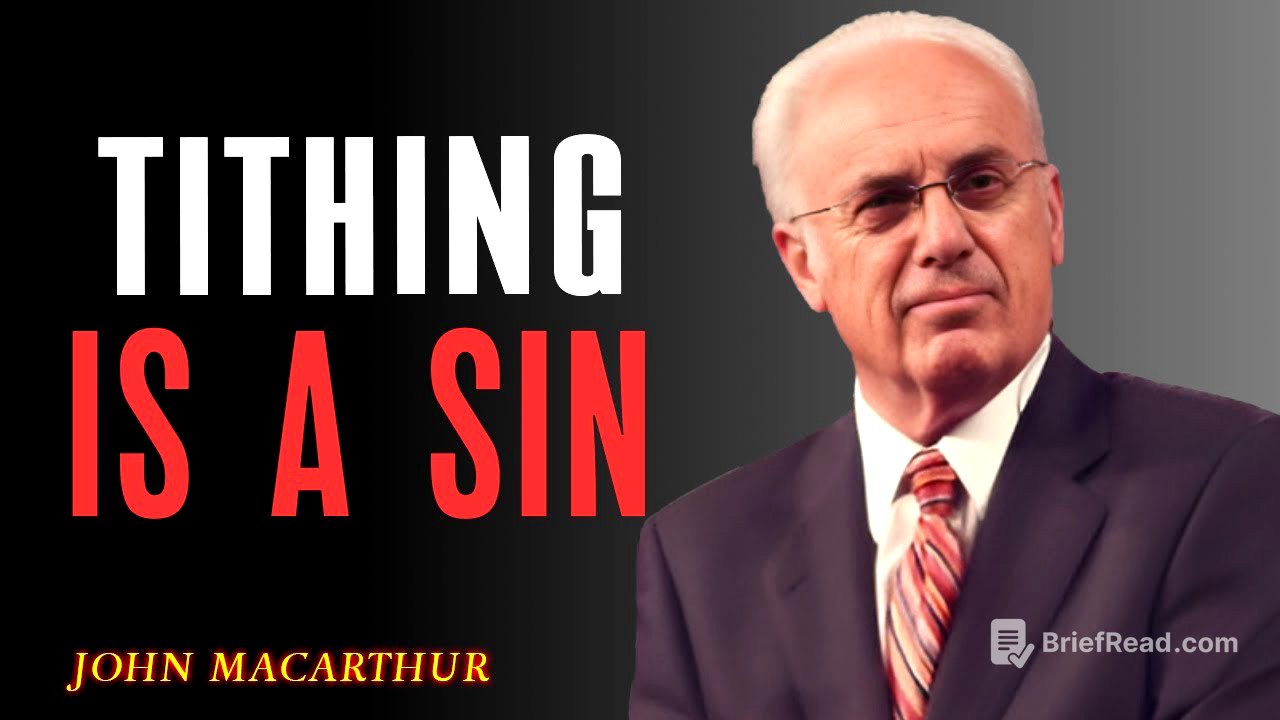TLDR;
This video explores the topic of tithing, questioning whether it is a sin and examining its place in both the Old and New Testaments. It emphasizes that believers are not under the Mosaic law and that giving should be voluntary and driven by love, not legalistic obligation. The video also addresses the dangers of legalism in the church, particularly the misuse of Malachi 3:10 to pressure believers into tithing. It advocates for grace giving, where believers give generously and cheerfully from the heart, rather than adhering to a fixed percentage. Additionally, the video discusses the increasing opposition to biblical truth, the necessary refinement within the church, the urgency of the Great Commission, and the blessed hope of Christ's return.
- Tithing under the Old Testament law was a national requirement for Israel, not personal free will giving.
- The New Testament never commands the church to tithe; instead, it teaches grace giving, which is voluntary and driven by love.
- Legalistic tithing corrupts grace, turning worship into a transaction and denying the sufficiency of Christ.
- True biblical giving is generous, sacrificial, cheerful, and spirit-led, focusing on the heart rather than a specific number.
- Christians will face increased opposition to biblical truth and must remain unwavering in their faith.
- The church will undergo refinement, purifying itself from false teachings and worldliness.
- The Great Commission remains urgent, calling believers to proclaim the gospel to all nations.
- The blessed hope of Christ's return provides comfort, strength, and endurance, shaping how believers live and engage with the world.
Is Tithing a Sin? [0:02]
The video begins by addressing the question of whether tithing is a sin, noting that while the Old Testament required tithing as a national obligation for Israel, the New Testament emphasizes grace giving. Tithing in the Old Testament was a form of taxation to support the priesthood, national feasts, and the poor, mandated within a covenant designed specifically for Israel. The New Testament, however, does not command tithing but instead promotes voluntary giving driven by love, as taught by Paul in 2 Corinthians 9:7.
The Old Testament Context [4:58]
The video explains that tithing in the Old Testament was not merely an act of generosity but a mandated system within the covenant between God and Israel, serving as a fundamental part of the Mosaic law. While Abraham and Jacob made voluntary offerings, the formal command to tithe came later as part of the Mosaic law, requiring a tithe of everything from the land. This system supported the Levitical priesthood, funded national feasts, and provided for the poor, involving more than a single 10% contribution. The Levites received tithes from other tribes, and they themselves gave a tenth to the priests, ensuring the religious order's functioning. Additionally, the festival tithe required Israelites to set aside a tenth for communal meals during religious festivals, and every three years, a poor tithe was collected for the needy, making the total required contribution about 23.3% per year.
Tithing as an Obligation [8:50]
Tithing was an obligation, functioning as a taxation system supporting Israel's religious and governmental structures, with failure to comply considered disobedience to God. Malachi 3:8-10, often cited in modern discussions, rebukes Israel for robbing God by neglecting their covenantal obligations, resulting in agricultural hardship. The promise attached to this passage was covenantal, specific to Israel's repentance and resumption of tithing, not a universal promise for all believers. The enforcement of tithing was tied to Israel's national identity and religious life, but with Christ's coming, the old covenant ended, and a new covenant was established.
Jesus and Tithing [11:21]
Jesus mentioned tithing in the gospels while rebuking the Pharisees for their hypocrisy, acknowledging it as a legal requirement under the Mosaic law but condemning their neglect of justice, mercy, and faithfulness. This statement was made before the new covenant, not serving as a binding command for the church today. Hebrews 7, referring to Abraham giving a tenth to Melchizedek, highlights the superiority of Christ's priesthood over the Levitical system, not mandating continued tithing. After Christ's resurrection, the New Testament provides no command for believers to tithe, with the apostles never imposing it on Gentile believers.
Grace Giving in the New Testament [15:10]
The early church practiced voluntary, spirit-led giving, with believers sharing their possessions out of love, not obligation. Paul states in 2 Corinthians 9:7 that each person should give as they have decided in their heart, not reluctantly, as God loves a cheerful giver. This principle contrasts with the Old Testament's mandated tithes, emphasizing generosity rather than law. The epistles exhort Christians to give freely, sacrificially, and joyfully, focusing on the giver's willingness, not an imposed percentage. Paul commends the Macedonian believers for giving beyond their ability, moved by grace, making giving under the new covenant an act of worship and gratitude, not a legalistic obligation.
The Foundation of Grace Giving [15:53]
Grace giving is rooted in the new covenant, where giving is a voluntary act of worship motivated by gratitude for God's grace in Christ. Acts 2:44-45 describes believers voluntarily sharing their possessions, a natural outpouring of love transformed by the gospel. Acts 4:32-35 emphasizes that these acts were entirely voluntary, without set percentages or compulsory demands, led by the spirit out of love. The account of Ananias and Sapphira in Acts 5 highlights that their sin was in lying about their giving, not in withholding part of the money, confirming that giving was entirely voluntary.
Paul's Teaching on Grace Giving [18:41]
Paul reinforces grace giving in his letters, commending the Macedonian churches for their generosity despite their poverty, giving out of love and in response to God's grace. He emphasizes that giving should be a willing and joyful act, with God valuing the heart behind the giving, not demanding a fixed amount. Generosity leads to spiritual blessing, but the motivation for giving is to glorify God and bless others, exemplified by Christ's sacrifice. Paul teaches that giving should be planned and intentional, regular and proportional, but without coercion, as many churches misuse scripture to pressure believers into mandatory tithing.
The Broader Lifestyle of Generosity [22:38]
Grace giving extends beyond money, urging believers to offer themselves entirely to the Lord, including time, talents, resources, and life itself. Financial giving is part of a broader lifestyle of generosity and sacrifice. Paul expresses gratitude for the Philippian church's support, describing their gifts as a fragrant offering pleasing to God, demonstrating that giving is an act of worship. Grace giving reflects trust in God's provision, fostering unity within the body of Christ, and ensuring wealth is used for eternal purposes. Ultimately, it is about living a life reflecting God's generosity, responding to His love with open hands and joyful hearts, and participating in God's work.
The Dangers of Legalism [24:51]
Legalism, a major threat to the gospel, includes imposing tithing as a requirement under the new covenant, undermining grace and distorting Christian giving. It reintroduces obligation and merit into a covenant based on grace, resembling the practices Jesus rebuked the Pharisees for. Misusing Malachi 3:8-10 to pressure believers into mandatory tithing ignores the fundamental change brought by Christ's fulfillment of the law. Making tithing a requirement logically implies enforcing all aspects of the Mosaic law, contradicting the New Testament's teaching that believers are under grace, not law.
Distorting Motivation and Creating False Hierarchies [29:05]
Legalistic tithing distorts the motivation behind giving, replacing love, gratitude, and joy with fear of curses or being labeled unfaithful, contradicting 2 Corinthians 9:7. Giving under compulsion is religious coercion, turning worship into a legalistic duty. It creates a false hierarchy where those who give more are seen as more spiritual, a mindset Jesus condemned. Legalistic tithing fosters a transactional mindset, viewing God as a vending machine, a form of the prosperity gospel distorting biblical teaching on God's provision.
The Apostles' View on Giving [31:34]
The apostles viewed giving with an emphasis on willingness, generosity, and sacrifice, never obligation, as seen in the Jerusalem council in Acts 15, which did not include tithing as a requirement for Gentile believers. Paul's instructions consistently emphasize willingness and generosity, not a rigid standard. Turning tithing into a legalistic requirement can lead to financial strain and guilt for those unable to give 10%, which is religious oppression, not biblical giving. Legalism shifts the focus from grace to works, turning worship into a burden and replacing joy with obligation.
The Gospel of Freedom [33:53]
Legalism corrupts the heart of giving, making it a law rather than a response to God's love, distorting the gospel by implying financial giving can earn divine favor. The gospel of Jesus Christ is a message of freedom from sin, condemnation, and the burdens of the law. Christ fulfilled the old covenant and inaugurated the new covenant based on grace. The believer's relationship with God is mediated through Christ's work, not external laws, rituals, and sacrifices. Imposing mandatory tithing distorts the gospel, reintroducing legalism that Christ abolished.
The Sufficiency of Christ [35:37]
The New Testament affirms that believers are not under the law, as Paul declares in Romans 6:14. Requiring tithing as a legal obligation denies the sufficiency of Christ's fulfillment of the law, placing believers back under a system from which they have been set free. Paul warns against returning to the bondage of the law in Galatians 5:1, stating that any legal requirement to the gospel nullifies grace. The book of Hebrews emphasizes the superiority of the new covenant over the old, with Christ as the believer's high priest, rendering the legal requirements of the Levitical system no longer in effect.
Apostolic Teaching and Christian Stewardship [38:35]
The apostles never imposed tithing as a requirement, with their teaching on giving rooted in grace, generosity, and voluntary worship. Paul's emphasis in 2 Corinthians 9:7 refutes mandatory tithing, stating that giving is a matter of the heart led by the spirit. Tithing as a requirement misrepresents the gospel and distorts Christian stewardship. Everything a believer has belongs to the Lord, and Christian giving is about responding to God's grace with total devotion. Requiring tithing creates an artificial standard of righteousness, missing the heart of New Testament giving, as Jesus illustrates in Mark 12:41-44 with the poor widow's offering.
Financial Burden and Church Leadership [41:37]
Enforcing tithing places a financial burden on those struggling, contrary to scripture, which teaches giving according to ability, not a fixed demand. Enforcing tithing corrupts church leadership, with some preachers manipulating people into giving under threat of divine punishment, which is spiritual abuse. True New Testament giving reflects God's generosity, as Paul writes in 2 Corinthians 8:9, with Christ giving everything out of love. Christian giving should be a joyful response, not a burdensome obligation imposed by legalistic tradition.
Protecting the Doctrine of Grace [43:49]
The doctrine of grace must be protected from legalism, including mandatory tithing, as anything that places believers back under the law denies the freedom Christ purchased. Turning giving into a duty rather than a privilege undermines the gospel of grace, compelling believers to give out of fear rather than love, distorting Christian worship. The church is called to walk in the freedom of the new covenant, where giving is a joyful response to grace, not a legal requirement, with the believer's relationship with God based on a heart transformed by the gospel.
Increased Opposition to Biblical Truth [45:57]
Christians will face increasing opposition to biblical truth, a direct confrontation with the foundations of the Christian faith, as the world grows darker and rejects God's word. This opposition is not surprising, as Jesus warned his followers would experience hatred because of their allegiance to him. This hostility is a testament to the truth of the gospel, which contrasts with the values of the world. The intensity of this opposition is shifting, becoming a reality in Western civilization, where Christianity is increasingly marginalized and vilified.
Pressure to Conform and the Christian Response [50:58]
As culture shifts, the pressure on Christians to conform to societal norms will increase, particularly regarding moral teachings on the sanctity of life, marriage, and sexual ethics. Christians cannot conform to the patterns of this world, as Romans 12:2 exhorts, and must not compromise their beliefs to fit in or avoid persecution. The world will seek to discredit Christianity, framing it as a threat to human rights and a barrier to social progress. Those who stand firm will be portrayed as intolerant and unloving, with the language of tolerance used to justify silencing Christians who speak the truth.
Personal Opposition and the Gospel's Division [52:55]
Opposition will take a personal form, with Christians at odds with family, friends, and co-workers, facing immense pressure to fit in and avoid being labeled as bigoted. The temptation to remain silent or water down the gospel will be strong, but Jesus warned about this division in Matthew 10:34-36. The gospel confronts the heart, forcing individuals to choose between the kingdom of God and the kingdom of this world, often leading to division. This opposition will intensify as society becomes more secular and hostile to the truth, with governments imposing laws contradicting biblical teachings.
The Advancing Kingdom of God [54:57]
Increasing opposition is a sign of the advancing kingdom of God, indicating that the truth is having its desired effect. The gospel is meant to confront, convict, and call people to repentance. Those who respond with faith and obedience will inherit eternal life, while opposition confirms the need for the Savior. As Paul wrote in 2 Timothy 3:12, all who desire to live a godly life in Christ Jesus will be persecuted. Despite the overwhelming opposition, Christ has promised to be with his people, empowering them to stand firm and proclaim the truth.
True Form of the Church [57:14]
The church in its true form is not a place where the culture of the world is allowed to infiltrate unchecked, but a community set apart, living according to God's word and reflecting His holiness. As society secularizes, God is refining His bride, removing impurities and preparing her for a greater purpose. The church has always faced the temptation to compromise, diluting the gospel and accommodating cultural pressures. The refinement of the church is not adapting to the world's standards but conforming to God's unchanging standard.
Renewed Commitment to Scripture [59:20]
The purification will begin with a renewed commitment to the authority of scripture, treating the Bible as the inherent and infallible word of God, not interpreting it according to personal preference or cultural trends. The rise of progressive Christianity, which seeks to reinterpret biblical teachings to align with contemporary values, is an alarming sign. The gospel is the eternal truth of God's word, not ours to change but to faithfully proclaim and live by. God's word stands, and we must hold it as our highest authority.
Deepened Sense of Holiness [1:00:23]
The church will experience a deepened sense of holiness, reflecting God's character in every area of life, as holiness is not optional but the essence of being a follower of Christ. The church must be a living testament to the transforming power of the gospel, demonstrating God's holiness in relationships, words, and actions. As the church becomes more faithful to God's word, it will encounter greater resistance from the world, with the tension between God's holiness and the world's sinfulness increasing.
Purging of False Teachers [1:03:39]
The church's purification will involve purging false teachers and teachings, guarding against errors such as the prosperity gospel and teachings that deny essential doctrines. Pastors, leaders, and believers must discern truth from error, testing all things by scripture and holding fast to the gospel. God will purge corrupt influences, restoring the church to her true purpose as the light of the world, proclaiming the excellencies of Him who called us out of darkness. The church exists to make disciples, spread the gospel, and glorify God.
True Mission of the Church [1:05:12]
As the world grows darker, the church must shine brighter, standing firm in God's word and proclaiming the hope of the gospel. This purification is not quick but continues until Christ's return, with God purifying His church and preparing her for eternal glory. This process is for our good, making us more like Christ and preparing us to dwell with Him in His eternal kingdom. The urgency of the Great Commission is more pressing than ever, with the gospel to be proclaimed to every nation, tribe, tongue, and people.
The Great Commission [1:06:28]
The Great Commission is a command from Jesus to make disciples of all nations, not a suggestion for a select few. The urgency of this mission is tied to the lostness of the world, with millions passing into eternity without hearing the gospel. The harvest is plentiful, but the laborers are few, requiring workers to bring in the harvest before it is too late. The world is increasingly hostile to the gospel, making evangelism more difficult, but we must preach the word in every season, whether favorable or unfavorable.
Discipling the Nations [1:10:23]
The Great Commission is not only a call to preach the gospel but also to disciple the nations, walking alongside new believers, teaching them, and helping them grow in their relationship with Christ. The church must commit to both evangelism and discipleship, presenting everyone mature in Christ. The gospel transcends cultural, social, and geographical boundaries, calling us to reach the unreached and share the message of Christ with those who have never heard His name.
Empowered by the Holy Spirit [1:12:23]
We are not alone in this mission, as Jesus promised to be with us, empowering us by His Holy Spirit and helping us make disciples. We do not carry the weight of this mission on our own but in the strength of the one who has all authority. The urgency of the Great Commission means we cannot afford to be complacent but must make the most of every opportunity to proclaim the truth of Christ. The time is drawing near when Christ will return, making the mission even more urgent.
Examining Our Priorities [1:14:01]
We must examine our priorities, asking if we are truly living in light of the Great Commission, actively engaging in evangelism and discipleship, and prioritizing the spread of the gospel above all other concerns. The love of Christ should control us, motivating us to live for Him and make His gospel known. As the world becomes increasingly hostile to the message of Christ, the urgency of the Great Commission intensifies, calling us to go into the world with the message of hope and salvation.
The Blessed Hope of Christ's Return [1:15:59]
The blessed hope of Christ's return is the ultimate source of comfort, strength, and endurance for every believer, shaping how we live, suffer, and engage with the world. This hope is grounded in the promises of God's word and has profound implications for our present circumstances and future destiny. Jesus assured His disciples that He would return, promising to prepare a place for them and take them to be with Him. This promise is the foundation of the Christian's hope, a literal truth that will occur in history.
Certainty of Christ's Return [1:18:48]
The certainty of Christ's return provides believers with an unshakable hope, not dependent on the unpredictable circumstances of this life. In a world full of uncertainty, the return of Christ is the one certainty that can anchor the soul, reminding us that God is still in control. The ultimate victory has already been secured through Christ's death and resurrection, and His return will bring that victory to completion. Believers can rest in the assurance that Christ's return will bring justice, peace, and the fulfillment of all God's promises.
Transformational Power of Christ's Return [1:20:44]
The anticipation of Christ's return has a purifying effect on the believer, motivating us to live holy and righteous lives, fueling our sanctification and spurring us on to greater obedience. Fixing our eyes on the return of Christ reminds us that this world is not our home, and we are called to live as citizens of heaven, set apart from the world. The return of Christ promises not only the renewal of the earth but also the transformation of our bodies, bringing an end to sickness, suffering, and death.
Fulfillment of God's Kingdom [1:22:48]
When Christ returns, He will establish His eternal kingdom, and all things will be made new, bringing the fulfillment of God's promises to His people. It will be the end of all suffering and the establishment of peace and joy in the presence of God. This future reality is a source of immense hope, reminding us that the sorrow, pain, and injustice of this world will not last forever. Christ's return will bring an end to all that is broken and wrong, bringing the final victory over sin and death.
Living with Eternal Focus [1:24:56]
The blessed hope of Christ's return is a living reality that has profound implications for how we live today, sustaining us through trials, motivating us to live holy lives, and compelling us to engage in the mission of the gospel. The anticipation of Christ's return shapes our present perspective and gives us an eternal focus, reminding us that our hope is not in the things of this world but in the promise of the eternal kingdom that Christ will establish when He returns. As we await His return, we are called to live faithfully, to endure with hope, and to share the good news of Christ with a world that desperately needs it.








